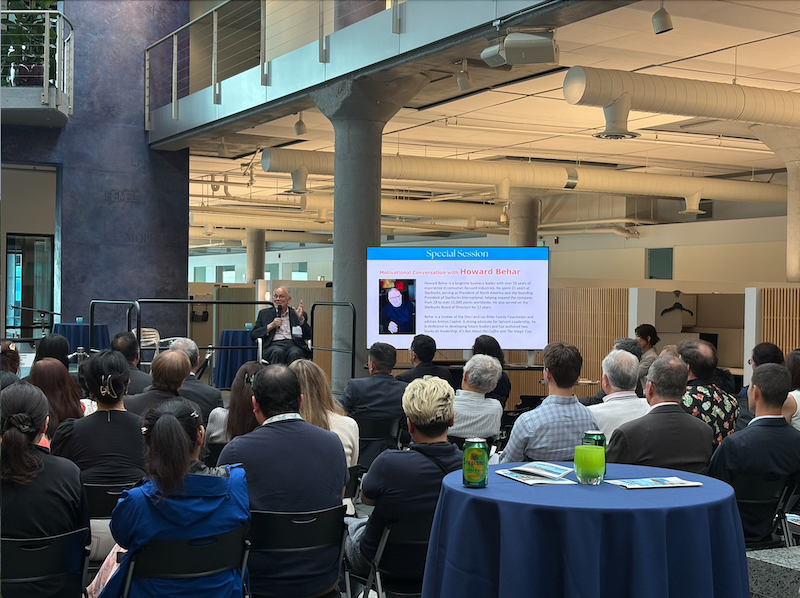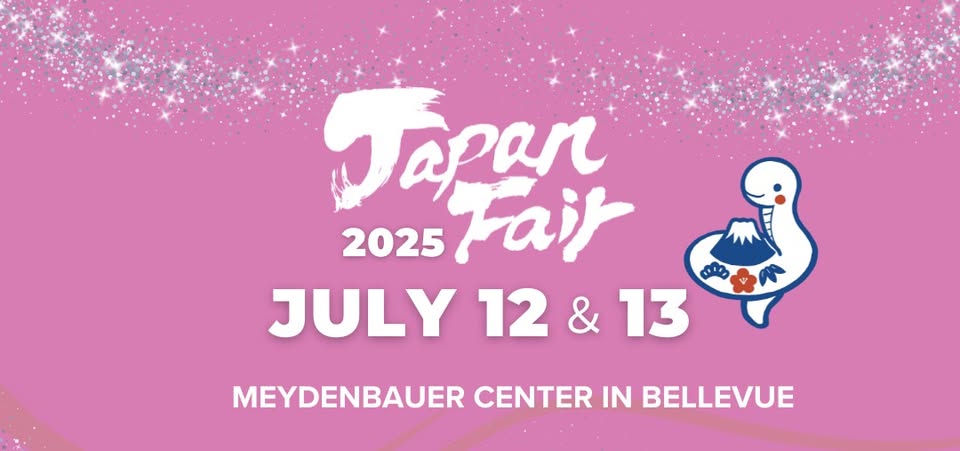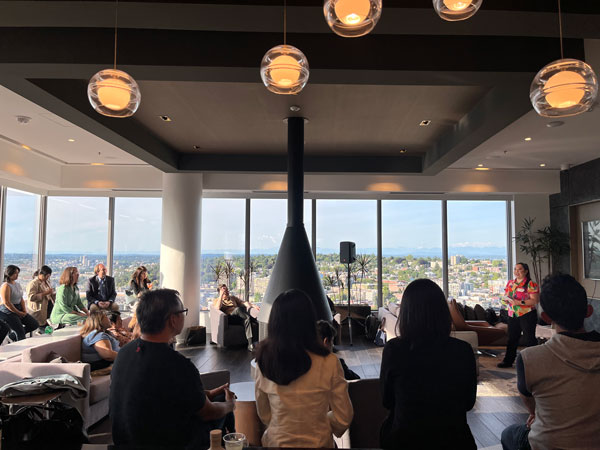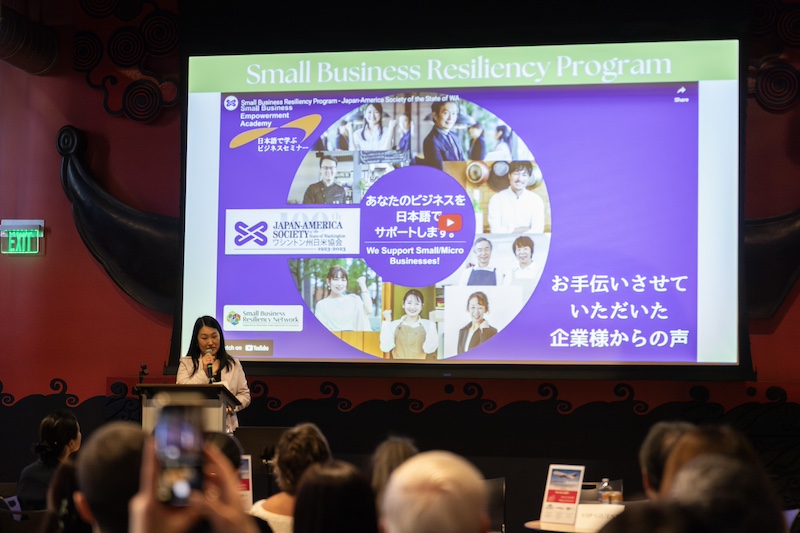 On Thursday, July 24, members of the Japan-America Society attended a special reception at the Washington Athletic Club to hear a talk by former Ambassador Ichiro Fujisaki and Minoru Makihara, chair of CULCON. Numerous topics were covered by the two men’s speeches and the following Q&A session, but in general the discussion examined the challenges and benefits of Japanese students studying abroad in the United States, as well as ideas for improving English education in Japan.
On Thursday, July 24, members of the Japan-America Society attended a special reception at the Washington Athletic Club to hear a talk by former Ambassador Ichiro Fujisaki and Minoru Makihara, chair of CULCON. Numerous topics were covered by the two men’s speeches and the following Q&A session, but in general the discussion examined the challenges and benefits of Japanese students studying abroad in the United States, as well as ideas for improving English education in Japan.
Mr. Makihara’s talk began with a brief history of CULCON, a conference on cultural and educational exchange between the United States and Japan. Education is both a central concern of CULCON and of Mr. Makihara’s remarks; he cited the declining number of Japanese youth studying in the United States and affirmed CULCON’s, and various politicians’, commitment to reversing that trend. According to Mr. Makihara, former Prime Minister Fukuda is working with a CULCON educational task force to encourage Japanese students to study in the U.S., and Prime Minister Abe increased the budget for sending Japanese students and teachers to and from the U.S. by about 15 percent this year.
Next, Mr. Makihara gave some potential reasons for the decline of Japanese international students in the U.S. One reason (that troubles even American students) is that tuition in the U.S. is much too expensive. Another reason is that coming to the U.S. is seen as riskier for students’ future careers than going into a Japanese university or corporation. Also, Japanese families are getting smaller, and older generations want their children close by. Or perhaps the differences between the Japanese and the American academic calendars make it difficult to switch between the two education systems. Mr. Makihara stressed that a liberal arts education — currently somewhat lacking in Japan — encourages students to think about the big picture: what they want their country to be, and what they want their country’s international relationships to look like.
In contrast with his critical image of Japan’s current educational situation, Mr. Makihara cited the JET Program as not only an important part of English education in Japan, also as a springboard for people looking to make a career in international relations or business.
 Amb. Fujisaki began his talk by congratulating his Seattleite audience on the Seahawks’ Superbowl victory but quickly settled into his theme of gently refuting myths about English education in Japan. He began by asserting the importance of Japanese people being able to use functional English at a certain level and maintained that the average Japanese person is not at that level yet. The proposed solution is to train Japanese national English language teachers by sending them to the U.S. for a year to properly learn English usage and pronunciation. This program, as Amb. Fujisaki said, would be “a great investment” because these well-trained teachers would provide a positive example of spoken English for countless students over the course of their careers.
Amb. Fujisaki began his talk by congratulating his Seattleite audience on the Seahawks’ Superbowl victory but quickly settled into his theme of gently refuting myths about English education in Japan. He began by asserting the importance of Japanese people being able to use functional English at a certain level and maintained that the average Japanese person is not at that level yet. The proposed solution is to train Japanese national English language teachers by sending them to the U.S. for a year to properly learn English usage and pronunciation. This program, as Amb. Fujisaki said, would be “a great investment” because these well-trained teachers would provide a positive example of spoken English for countless students over the course of their careers.
Like Mr. Makihara, Amb. Fujisaki also addressed some potential reasons why fewer Japanese students are studying in the U.S. He decried the outdated assumption that an international student or businessperson must be an expert on the culture and history of their home country before going abroad — apparently constantly dumping information on one’s listeners can be grating. Secondly, Amb. Fujisaki defended Japanese youth, saying that any apparent introversion is merely a product of tough circumstances. English education in Japan isn’t at a high enough level, so Japanese students don’t have the skills to follow American college courses and therefore don’t study abroad; Japanese companies favor potential employees who have graduated from Japanese universities or don’t promote “language experts”; there isn’t enough incubator capital to take business risks in the Japanese economy. For these reasons, Amb. Fujisaki said that we shouldn’t put too much wight on students; it is also the responsibility of the government and corporations to change their policies and give Japanese youth a chance to succeed by using their English.
In his closing remarks, Amb. Fujisaki stressed the importance of cooperation over competition. He mentioned that most Japanese workers get the majority of their practical learning on the job from their superiors and wondered why education or international relations can’t have that cooperative flow of information — for the good of everyone.
After the two speeches came the Q&A session. A few of the younger members of the audience wanted to know what it took to be a successful international leader. Mr. Makihara stressed that an international leader must have a global perspective and be able to view Japan within the greater picture of a global world; Amb. Fujisaki said that while a global leader can come from any country, they must have a strategic mind and the ability to communicate well (again, that means English).
Other questions focused on effecting positive change in the Japanese education system, such as having universities consider applicants’ experiences along with their test scores, introducing the International Baccalaureate program, or changing the academic calendar to match the U.S.’s. While the two speakers supported these initiatives, they recognized that change was not happening as rapidly as they would like. Problems in the American education system that prevent the flow of exchange students, such as high tuition, were presumably also on everyone’s mind, even if they were not as thoroughly discussed.
Overall, the event was an informative and enjoyable experience for all, despite the sometimes bleak topics of discussion. However, the mood in the room remained positive throughout, and hopefully everyone present will continue to work together to promote educational exchanges between Japan and the United States.







